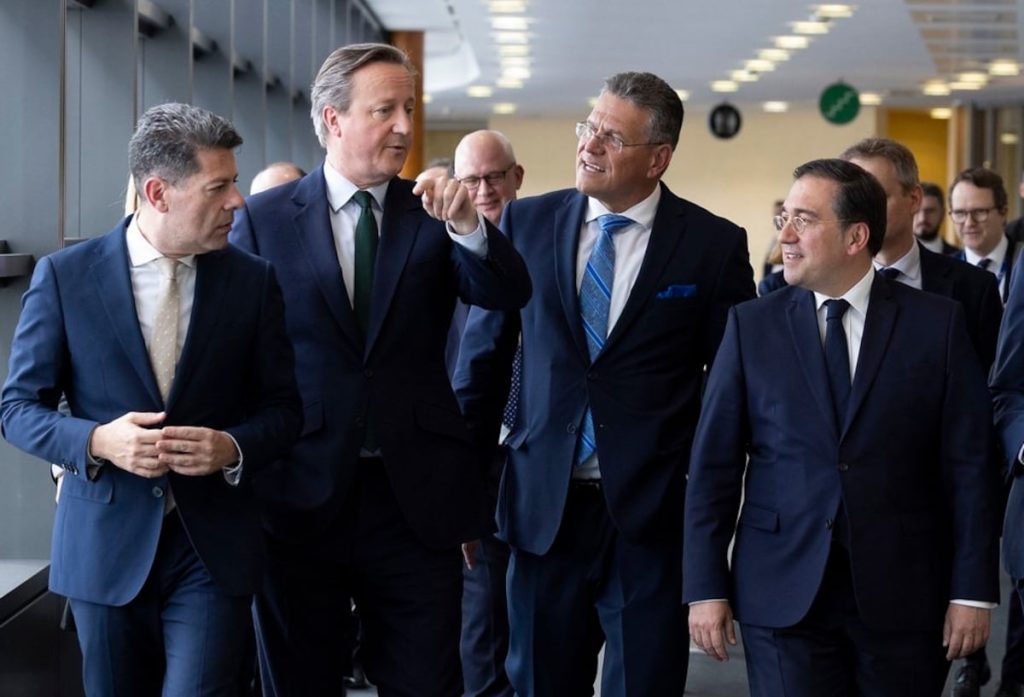The Spanish Minister of Foreign Affairs, José Manuel Albares, is scheduled to meet in Brussels with his British counterpart, David Cameron, and with European Vice President Maros Sefcovic on Thursday to finalize an agreement regarding the relationship between Gibraltar and the EU post-Brexit. Diplomatic sources state that the agreement safeguards the positions of Madrid and London on sovereignty matters, involves the demolition of La Verja that separates the British colony from Spain, and regulates various aspects, although some measures may take years to fully implement. Both parties have agreed that Frontex agents, under Spanish security forces, will control travelers arriving in Gibraltar who can then move freely within the Schengen area. A previous meeting on April 12 between Albares, Cameron, and Sefcovic in Brussels unblocked negotiations that had been ongoing for over a year and a half, with significant progress noted on issues such as joint use of the airport, circulation of goods, and mobility of people. The goal of the upcoming meeting is to advance towards an agreement that will bring prosperity, confidence, legal security, and stability to citizens in the Campo de Gibraltar area.
The sources expect the meeting to finalize a political agreement on the status of Gibraltar, although the complex and detailed nature of the final text may delay its signing. The new treaty will need ratification by the European Parliament formed after the elections on June 6. During a meeting with the Andalusian regional government and local mayors, Albares informed them about the negotiations, ensuring that the pact protects the rights of around 15,000 cross-border workers, over 50% of Gibraltar’s workforce, both current and future. He addressed the issue of Spanish workers on the Rock receiving lower pensions than Gibraltarians, a discrimination that the agreement aims to resolve. The agreement is expected to include joint use of the airport on the isthmus of the Rock, with the resumption of flights to Madrid or Barcelona anticipated.
The Andalusian councilor requested a special fiscal regime for the Campo de Gibraltar region, as local companies may face disadvantages compared to those in Gibraltar due to differences in corporate tax rates. The agreement reportedly includes a gradual harmonization of fiscal policies between the British colony and its Spanish surroundings. The preparation for this Thursday’s meeting has been ongoing for several days, with confirmation delayed until the final obstacles were cleared through continuous contacts between the three parties involved. Subscribe to continue reading and stay updated on developments in the region.
Overall, the outcome of the meeting is crucial for defining the future relationship between Gibraltar and the EU after Brexit, taking into account the interests of Spain, the UK, and the local population. Addressing issues related to sovereignty, border controls, mobility, and economic considerations is paramount for ensuring stability and prosperity for all stakeholders involved. The willingness of both parties to negotiate and find common ground on complex matters reflects a commitment to constructive dialogue and cooperation in resolving long-standing issues. By working towards a comprehensive agreement that addresses various aspects of the Gibraltar-EU relationship, the ministers aim to provide legal certainty and protection for citizens on both sides of the border, laying the foundation for a positive future partnership.
The potential inclusion of joint projects, such as the use of the airport and harmonization of fiscal policies, demonstrates a commitment to enhancing cooperation and economic development in the region. The agreement’s focus on protecting the rights and interests of workers in Gibraltar and the Campo de Gibraltar area highlights a commitment to social welfare and inclusivity. The upcoming ratification process in the European Parliament underscores the importance of democratic approval for the agreement, ensuring transparency and accountability in the decision-making process. Ultimately, the successful conclusion of the negotiations and the signing of the agreement would represent a significant step towards consolidating a mutually beneficial relationship between Gibraltar and the EU, fostering cooperation, economic growth, and stability in the region.


